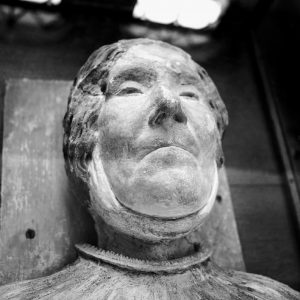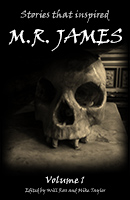 Textaphobes beware! This month Will and Mike tackle Henrietta Dorothy Everett’s “The Death Mask”, a supernatural farce about termagant wives, gold diggin’ husbands and menacing fabrics.
Textaphobes beware! This month Will and Mike tackle Henrietta Dorothy Everett’s “The Death Mask”, a supernatural farce about termagant wives, gold diggin’ husbands and menacing fabrics.
Story notes:
- Monty writes,“Going back a few years I light on Mrs Everett’s The Death Mask, of a rather quieter tone on the whole, but with some excellently conceived stories.” ( Some Remarks on Ghost Stories, The Bookman, 1929). We had our pick of stories from this collection and of course went with the titular (and best) tale.
- Mrs Everett wrote most of her work under the pseudonym of Theo Douglas, though the anthology ‘The Death-mask’ was published under her own name just three years before her death in 1923, aged 72. We struggled to find much about Mrs E. online, but did reconstruct her family tree and found out about the tragic and horribly noteworthy death of her Grandfather’s brother!
- That said, we did find that there is a bundle of papers regarding Mrs Everett’s family, together with that of her husband, at the Naval archives in Greenwich. Material for a potential thesis? We’d love to know more about her.
- There’s a good wikipedia article on the complex set of rules that developed around mourning in the Victorian era. It seems like the mourning expectations for women were more arduous than for men, with women being expected to be in mourning for a husband for 1-4 years, while men got away with mourning for a wife for just 3-5 months! By these standings, Tom has done his fair share.
- The picture above is the death mask of Grace, Lady Manners of Derbyshire, recorded for posterity after her death. Photo credit to David Brierley.
Podcast: Play in new window | Download
Subscribe: RSS








Another great episode. I do feel the need to quibble. If Tom Enderby had faults as a husband, they don’t seem to show up in the text. And if they aren’t in the text, how seriously can we take such speculation? What we do know for certain is that his seemingly overbearing wife (as described in the text) had the power to haunt him from the grave, and chose to do so. As such, I see no need to comb through Tom’s potential misdemeanors – he was married to a witch! So I’m with Tom, and can see no reason why he shoulnd’t marry a pretty young thing if he could get away with it.
Regarding Tom’s life tenancy in his wife’s house, it reminded me of a story from Judge Samuel Sewall’s autobiograpy. Sewall was one of the leading Puritans in early Boston, Massachusetts colony. The Puritans believed that the proper state for an adult was marriage, so mourning was quite short, and re-marriage often quite quick. A short time after becoming a widower, Sewall set his sites on a widow he knew. He asked to visit her, and showed his intentions. They quickly set about bargaining, being practical people, and the woman refused his request that she sign over her property to him should she pre-decease him. Apparently, she had a trunk full of silver and other household goodies that came down to her from her family, and she insisted that should she die, they should return to the family. And so, Sewall when home and considered the next woman on his list. This is an example of the importance of family at the time, including a wife’s family. She may take his name, and be subject to his rule, but only so far. Her family had its own honour to consider.
A great episode this one was good fun..
I just came here to comment as I had a few quarms about some of your interpretations of the widowed husbands motives and his morality.. but MarkB expressed my own opinion so eloquently I will defer to his post!
I’m flattered! Great minds think alike.
As I remember it, though I can’t give you a source, to be hipped is to be ill-at-ease, or to have the fidgets.
Bearing in mind Victorian levels of mortality in childbirth, it was considered practically necessary for a man to re-marry after the death of his wife.
I haven’t read the story yet (intrigued to, though!), but I agree with MarkB that there’s no reason for Tom to have to bind himself according to his wife’s preference that he never remarry. Presumably he didn’t hold a gun to her head and force her to marry him in the first place! For another (just about as creepy) view of a dying person trying to force their surviving spouse to accept unending domination from beyond the grave, see chapter 48 of George Eliot’s Middlemarch (Mr. Casaubon makes my flesh creep).
I’m excited for the Negotium Perambulans episode! This story is freely available in audio form online, read by Richard Crowest, as part of his E.F. Benson ghost story collection, which I’ve enjoyed very much. I feel like I always fumble trying to paste in links, but I’ll try: If that link disappears, you can get there by hand: corvidae . co . uk / benson
Anyway, “I’ll be [chased down by a giant carnivorous slug-demon] for Christmas, if only in my dreams!”
Victorian Ste(v)phensons always make me think of this song. https://youtu.be/S87mKwgYR6A